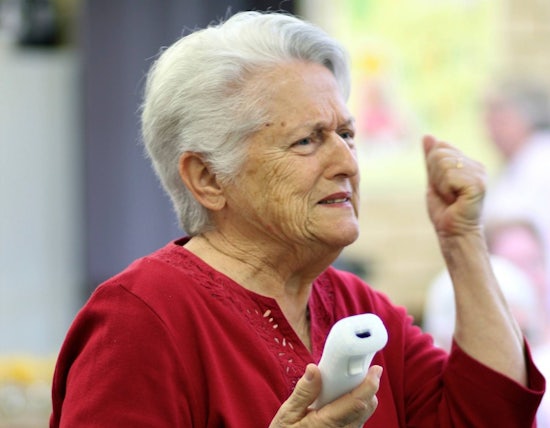Improving balance and brain through virtual world
Teams in retirement villages and aged care centres are invited to register for the 2014 Amana Living Wii World Cup – a virtual tenpin bowling competition for older people.

Amana Living Bull Creek (Frederick Guest Village), Margaret Platt, looking determined in the Amana Living Wii World Cup.
A study has confirmed that participation in Wii games improves mobility and balance, brain function and motor skills.
Western Australian aged and community care provider, Amana Living, chose tenpin bowling as one of the most popular activities reported by retirement facilities.
The Nintendo Wii, as opposed to real tenpin bowling, allows a wider range of people to participate – from retirement village residents in their 60s to those aged in their 90s in residential care centres or day clubs.
The Wii World Cup is the result of Amana Living’s commitment to enriching people’s lives as they age with meaningful and enjoyable activities.
Ray Glickman, Amana Living chief executive, says Wii World Cup, which is now entering its fifth year, presents cognitive challenges, the chance to sharpen motor skills and an enriching social experience.
“We found that even people with shoulder issues or those in wheelchairs can use their wrist and, with a bit of assistance, can bowl and take part in the fun,” Mr Glickman says.
The Wii World Cup went national in 2012, with 39 centres participating, representing aged care organisations in Western Australia, New South Wales and Queensland.
Forty one teams entered last year, which equates to 300 older people becoming physically, mentally and socially active.
The competition is structured over eight weeks. Each week, teams submit their game score to the central collection point run by Amana Living’s enrichment team.
The scoreboard tally is relayed back to them so they can see where they stand on the competition ladder. To keep the pressure off, teams can play many games and only send in scores from one. The competition rules also allow players to ‘come and go’ within a session and across the competition.
The benefits
A study by the Department of Sport and Recreation reported many benefits of Amana Living's Wii World Cup, including:
Improved mobility and balance – Many participants struggled to stand on their own or rise out of a chair or Zimmer frame in the beginning, but as they progressed, they stopped using their walking aids for balance and showed an increase in range of movement during the sessions.
Brain function – The majority of participants voiced concerns about operating the machines as their memory ‘was not that good any more’. One hundred per cent of participants successfully learned how to operate the machine and lost their fear of the technology. More than 60% could operate the machine independently, from turning it on and navigating between games to closing the system down.
Gross motor skills – Participants’ ‘hand eye’ coordination and reflexes improved noticeably during the program. The games increase in speed and difficulty based on responses and scores, therefore participants are constantly challenged.
2014 Amana Living Wii World Cup details
Date: Monday, 1 September – Sunday, 28 October 2014
Cost: $66 (inc. GST) per centre (contributes to overall prize pool)
Registration: Register by Friday, 29 August 2014.
Contact: Kylie Mathieson on 0417 461 595 or email kmathieson@amanaliving.com.au
Who can play? Teams of four or more interchangeable players from aged care centres, day clubs or retirement villages
What you need? Nintendo Wii, TV, Wii Sports Resort game software pack, enthusiastic coach























